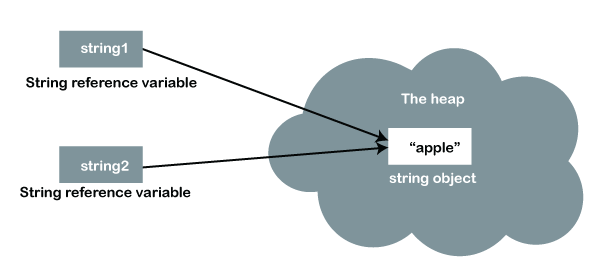Why Are Strings Immutable in Java? Exploring the Layout Decisions
Why Are Strings Immutable in Java? Exploring the Layout Decisions
Blog Article
Checking Out the Benefits of Immutable Strings in Modern Programming Paradigms
In the realm of modern programs paradigms, the idea of unalterable strings stands as a cornerstone of robust software program growth. The advantages they offer go beyond mere comfort; they fundamentally alter the means data is taken care of within applications. By adopting unalterable strings, developers can guarantee improved data integrity, boosted string safety and security, streamlined debugging procedures, enhanced safety and security measures, and efficient efficiency optimization. These advantages work as a testimony to the profound influence that welcoming immutability can carry the dependability and effectiveness of software application systems.
Boosted Data Integrity

By avoiding the adjustment of string items, immutability eliminates the threat of unintended adjustments to the data they hold. This not only enhances the security of the details however also boosts the integrity of the code that relies upon these strings.
Immutability additionally supports much safer multithreading settings, as concurrent access to immutable strings does not present the risk of data corruption with synchronised adjustments. This building simplifies the process of taking care of strings in identical programming situations.
In essence, immutability acts as a safety shield around the data kept within strings, improving their integrity by making sure that as soon as specified, their worths remain unchanged throughout the program's implementation.

Improved String Security
Immutable strings improve the thread safety of programs by making sure that when a string item is developed, its value can not be changed. This property gets rid of the danger of concurrent strings trying to modify the same string simultaneously, which could lead to data corruption or inconsistent states in the program - Why are strings immutable in Java?. In a multi-threaded atmosphere, where multiple threads gain access to and adjust information simultaneously, the immutability of strings offers a level of safety by assuring that the information continues to be unmodified throughout its lifecycle
Simplified Debugging Procedures
Provided the improved thread security assisted in by unalterable strings, a significant advantage emerges in the realm of streamlined debugging procedures. Immutable strings, as soon as produced, can not be modified, making it simpler to trace the circulation of information and determine the source of pests in a program. This immutability guarantees that strings remain consistent throughout the implementation of the program, minimizing the probability of unexpected changes that could bring about errors.
When debugging with mutable strings, programmers usually encounter concerns where a string's value is modified accidentally, making it testing to identify the source of a bug. Nevertheless, with immutable strings, the information continues to be unmodified, permitting programmers to concentrate on analyzing the actual reasoning of the code instead of tracking down where and when a string was customized inaccurately.
Additionally, immutable strings simplify the debugging procedure by allowing less complicated reproduction of bugs. Considering that immutable strings do not alter state, designers can recreate and study insects extra successfully, causing quicker recognition and resolution of problems within the codebase. This structured debugging workflow ultimately adds to higher software application top quality and improved general advancement effectiveness.

Raised Safety Steps
Enhancing information defense and fortifying system honesty, the usage of immutable strings in software applications adds dramatically to boosted security measures. Unalterable strings additionally play a crucial role in avoiding usual safety and security susceptabilities such as buffer overflows and SQL shot attacks, as attempts to adjust string information at runtime are naturally restricted.
Moreover, the immutability of strings enhances the predictability of program actions, making it less complicated to verify inputs and avoid unforeseen changes that can endanger protection. This predictability streamlines the process of bookkeeping and verifying code, making it possible for developers to identify potential security loopholes Look At This better. Overall, integrating unalterable strings into software program growth techniques not only enhances the effectiveness and dependability of applications however also strengthens their strength against protection threats.
Effective Efficiency Optimization
Building upon the structure of enhanced safety steps achieved with the use of unalterable strings, a crucial element to consider in software program growth is efficient efficiency optimization. When taking care of mutable strings, operations like concatenation or substring development usually result in the development of new string you can try this out objects, causing memory expenses and boosted handling time. Nevertheless, with unalterable strings, these procedures can be optimized to improve efficiency. By permitting strings to remain consistent and unchangeable, immutable strings assist in better memory management and caching opportunities, eventually enhancing the general effectiveness of the software.
Immutable strings likewise play an essential duty in multithreaded settings by promoting thread safety and security. Why are strings immutable in Java?. Because unalterable strings can not be changed as soon as produced, they can be shared throughout strings without the risk of unanticipated modifications, lowering the demand for synchronization systems and boosting concurrency. Moreover, unalterable strings simplify debugging procedures as designers can rely on that a string's worth will certainly remain regular throughout the program's execution, getting weblink rid of possible mistakes created by mutable state changes. To conclude, the usage of immutable strings not only enhances safety however additionally considerably adds to the efficient efficiency optimization of modern software application systems.
Verdict
Finally, the advantages of utilizing unalterable strings in contemporary programs standards can not be overemphasized. Boosted information integrity, boosted thread security, simplified debugging procedures, enhanced protection procedures, and efficient efficiency optimization all add to the total efficiency of shows tasks. By integrating unalterable strings into programming methods, designers can gain from an extra dependable and robust codebase.
Immutability, an essential attribute of strings in programming languages such as Java and Python, ensures that as soon as a string things is created, it can not be altered or customized.Immutable strings boost the thread safety of programs by making sure that when a string item is created, its worth can not be customized. Unalterable strings likewise play an important duty in preventing usual safety vulnerabilities such as buffer overflows and SQL injection attacks, as attempts to control string data at runtime are inherently limited.
By allowing strings to stay stable and constant, unalterable strings facilitate better memory management and caching opportunities, eventually boosting the total effectiveness of the software.
Unalterable strings simplify debugging procedures as developers can trust that a string's value will certainly continue to be regular throughout the program's execution, getting rid of possible mistakes caused by mutable state modifications.
Report this page